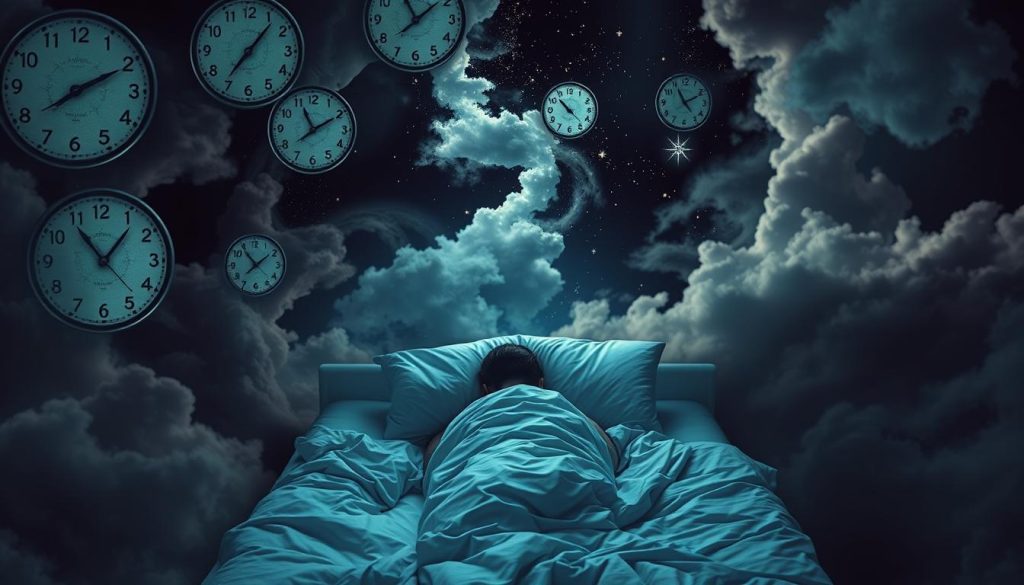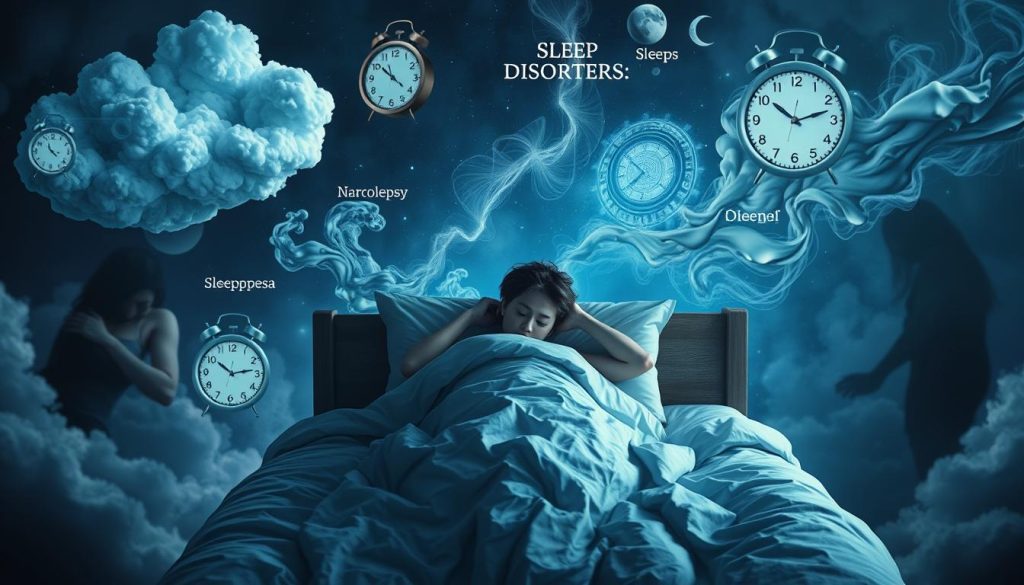Many of us struggle with sleep disorders in today’s fast world. These issues can really hurt our health and happiness. In this guide, we’ll look into sleep disorders, their effects, and how to manage them for better sleep.
Sleep is key to our lives, but it’s hard for many to get. Problems like insomnia, sleep apnea, and restless leg syndrome make us tired and grumpy. Knowing what causes these issues helps us find ways to sleep better and live better lives.
We’ll talk about common sleep disorders and how they affect us. We’ll also share the latest ways to deal with them. You’ll learn how to improve your sleep hygiene and find medical help. This will help you take charge of your sleep and get the rest you need.
The Impact of Sleep Disorders on Overall Health
Sleep disorders can harm our physical and mental health. It’s important to understand how sleep issues affect us. This knowledge helps us find the right treatment and improve our life quality.
Physical and Mental Consequences
Not getting enough sleep raises the risk of serious health problems. These include heart disease, high blood pressure, and type 2 diabetes. It also makes it hard to remember things, focus, and make decisions.
Poor sleep can lead to depression and anxiety too. These are serious mental health issues.
Quality of Life Implications
Sleep disorders affect more than just our health. They can make us tired, irritable, and less productive. This can hurt our relationships at work and home.
Not being able to do things we enjoy can make us feel unhappy. It lowers our happiness and makes life less fun.
| Potential Physical Effects | Potential Mental Health Impacts |
|---|---|
|
|

By tackling sleep disorders and focusing on healthy sleep, we can avoid many problems. Improving our sleep leads to a better, more enjoyable life.
Common Types of Sleep Disorders
Sleep disorders are many and can really affect a person’s life. They range from trouble falling asleep to breathing problems during sleep. We’ll look at some common sleep disorders to help you understand them better.
Insomnia
Insomnia makes it hard to fall or stay asleep. It can cause tiredness, mood swings, and trouble focusing. Stress, anxiety, and some health issues can cause it.
Sleep Apnea
Sleep apnea means you stop breathing many times while sleeping. This can make you very tired during the day and increase heart risks. It’s often linked to snoring and can be treated with CPAP therapy.
Restless Leg Syndrome (RLS)
RLS makes you feel like you must move your legs, often with a weird feeling. It can keep you awake and tired during the day. It’s thought to be caused by brain chemistry imbalances.
| Sleep Disorder | Symptoms | Potential Causes |
|---|---|---|
| Insomnia | Difficulty falling asleep, staying asleep, or waking up too early | Stress, anxiety, medical conditions, poor sleep hygiene |
| Sleep Apnea | Repeated pauses in breathing during sleep, snoring, daytime drowsiness | Obesity, neck circumference, genetics, nasal congestion |
| Restless Leg Syndrome (RLS) | Overwhelming urge to move the legs, uncomfortable sensations, difficulty falling asleep | Imbalance of neurotransmitters, iron deficiency, pregnancy, certain medications |
These are just a few sleep disorders people face. Each has its own causes, symptoms, and treatments. Getting medical help is key to finding the right treatment.

Insomnia: When Sleep Becomes Elusive
Insomnia makes it hard to fall or stay asleep. It affects our health, mind, and life quality. Let’s look at what causes it and how to sleep better.
Causes and Risk Factors of Insomnia
Many things can cause insomnia. Stress, anxiety, health issues, and lifestyle habits are some. Stressful events and health problems can mess with sleep.
Poor sleep habits also play a big role. This includes irregular sleep times and a bad sleep space. Blue light before bed is another issue.
Strategies for Better Sleep Hygiene
Improving sleep hygiene helps fight insomnia. Here are some tips:
- Go to bed and wake up at the same time every day.
- Have a calming bedtime routine, like a warm bath or reading.
- Make your sleep area dark, quiet, and cool.
- Stay away from screens before bed to avoid blue light.
- Exercise during the day to help sleep better at night.
- Don’t eat heavy meals or drink caffeine and nicotine before bed.
By tackling insomnia’s causes and improving sleep habits, we can sleep better. It’s a journey, and finding the right way takes time.

Sleep Apnea: A Disruption in Breathing Patterns
Sleep apnea is a sleep disorder that affects millions. It causes breathing to stop and start many times during sleep. This can lead to health problems and affect sleep quality. We will look at the types of sleep apnea, what causes them, and how to treat them.
Types of Sleep Apnea
There are two main types of sleep apnea: obstructive and central.
- Obstructive sleep apnea happens when the airway gets blocked. This is often because soft tissue in the throat collapses.
- Central sleep apnea is when the brain can’t control breathing during sleep. It’s not because of a blockage.
Causes and Symptoms of Sleep Apnea
The main sleep apnea causes are being overweight, getting older, having big tonsils or tongue, and certain body shapes. Sleep apnea symptoms include loud snoring, gasping, choking at night, feeling tired during the day, and trouble focusing.
Treating Sleep Apnea
Sleep apnea treatment can include changing your lifestyle. This means losing weight and sleeping on your side. You might also use a CPAP machine or oral appliance to keep your airway open. Sometimes, surgery is needed to fix physical blockages.
| Type of Sleep Apnea | Causes | Symptoms | Treatment Options |
|---|---|---|---|
| Obstructive Sleep Apnea | Excess weight, aging, large tonsils or tongue, anatomical abnormalities | Loud snoring, gasping or choking during sleep, daytime fatigue, difficulty concentrating | Lifestyle changes, CPAP machines, oral appliances, surgery |
| Central Sleep Apnea | Problem with the brain’s ability to control breathing during sleep | Shallow breathing or pauses in breathing during sleep, daytime fatigue, difficulty concentrating | Treating underlying medical condition, CPAP machines, supplemental oxygen |
If you think you might have sleep apnea, see a doctor. They can help you figure out if you have it and how to treat it. Getting help for sleep apnea can make you feel much better.
Restless Leg Syndrome: Uncontrollable Urges to Move
Restless leg syndrome (RLS) is a neurological condition that affects sleep and well-being. It makes people feel an overwhelming urge to move their legs. This urge can disrupt sleep and cause daytime fatigue and irritability.
It’s important to know the symptoms, causes, and treatments for RLS. This knowledge helps manage the condition effectively.
Diagnosis and Treatment Options
Doctors diagnose restless leg syndrome by checking medical history and symptoms. They might also look at family history of RLS. Sometimes, they order tests like blood work or sleep studies to confirm the diagnosis.
After diagnosing restless leg syndrome, several treatments are available. These aim to reduce the urge to move and improve sleep.
- Medication: Doctors might prescribe drugs like dopamine agonists or alpha-2-delta ligands. These can help reduce the urge to move and improve sleep.
- RLS treatment also includes lifestyle changes. These include:
- Keeping a regular sleep schedule
- Avoiding caffeine, alcohol, and tobacco before bed
- Exercising regularly
- Using hot or cold therapy on the legs
- In some cases, doctors may treat underlying conditions that cause restless leg syndrome symptoms.
With the right treatment and lifestyle changes, many people with restless leg syndrome can find relief. This improves their sleep and overall health.
Sleep Disorders: Understanding and Managing Symptoms
Dealing with sleep disorders can be tough. But knowing the symptoms and how to manage them can help. We’ll explore common symptoms and ways to improve your sleep.
Recognizing Sleep Disorder Symptoms
First, you need to know the symptoms of sleep disorders. Some common ones are:
- Difficulty falling asleep or staying asleep
- Excessive daytime sleepiness or fatigue
- Loud snoring or gasping for air during sleep
- Restless leg movements or urges to move your legs
- Frequent waking during the night
- Unrefreshing or non-restorative sleep
Pay attention to these signs. They might show you have a sleep disorder like insomnia or sleep apnea.
Managing Sleep Disorder Symptoms
After spotting your symptoms, it’s time to find ways to manage them. Here are some tips:
- Stick to a regular sleep schedule and bedtime routine.
- Make your bedroom quiet, dark, and free from distractions.
- Try relaxation techniques like deep breathing or meditation.
- Avoid caffeine, alcohol, and big meals before bed.
- Exercise regularly, but not right before bed.
- See a sleep specialist if your problems are severe.
By following these steps and getting help from doctors, you can better your sleep. This will improve your overall health and happiness.
The Role of Lifestyle Factors in Sleep Quality
Our daily habits and lifestyle choices greatly affect our sleep quality. Understanding how diet, exercise, and stress management impact sleep is key. This knowledge helps us make changes to improve our sleep health.
Diet and Sleep
The foods we eat can greatly affect our sleep. Nutrients like melatonin and tryptophan help us sleep better. On the other hand, caffeine and sugary snacks can keep us awake.
By eating sleep-friendly foods and avoiding stimulants before bed, we can sleep better.
Exercise and Sleep
Regular exercise can improve sleep quality. It helps us fall asleep faster and sleep more soundly. But, intense workouts close to bedtime can be too stimulating.
Finding the right balance of exercise and timing is key. This way, we can enjoy the sleep benefits of physical activity.
Stress Management and Sleep
Stress often leads to poor sleep. It causes anxiety, racing thoughts, and trouble falling or staying asleep. Stress management techniques like meditation, yoga, or deep breathing can help.
These practices help us manage our emotions and body responses. This way, we can sleep more restfully and restoratively.

